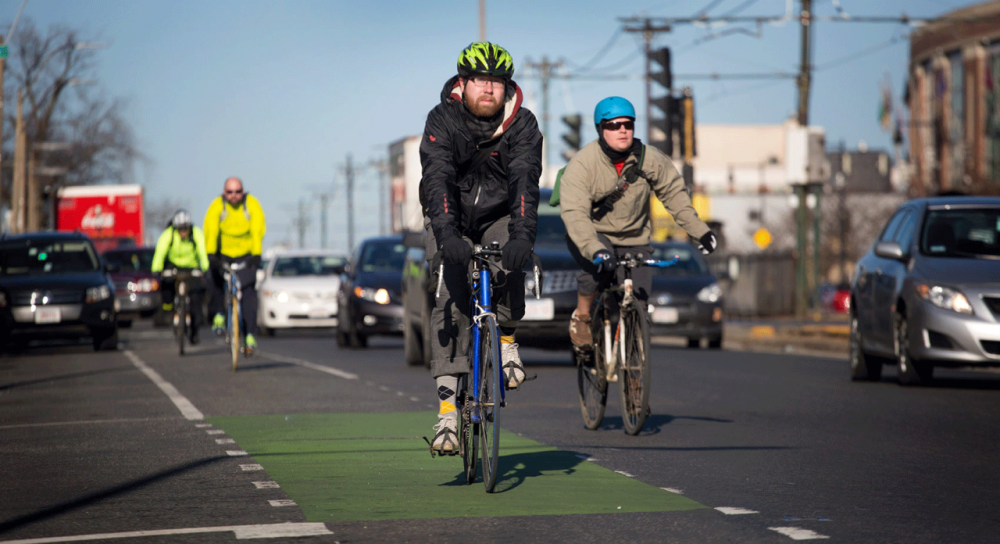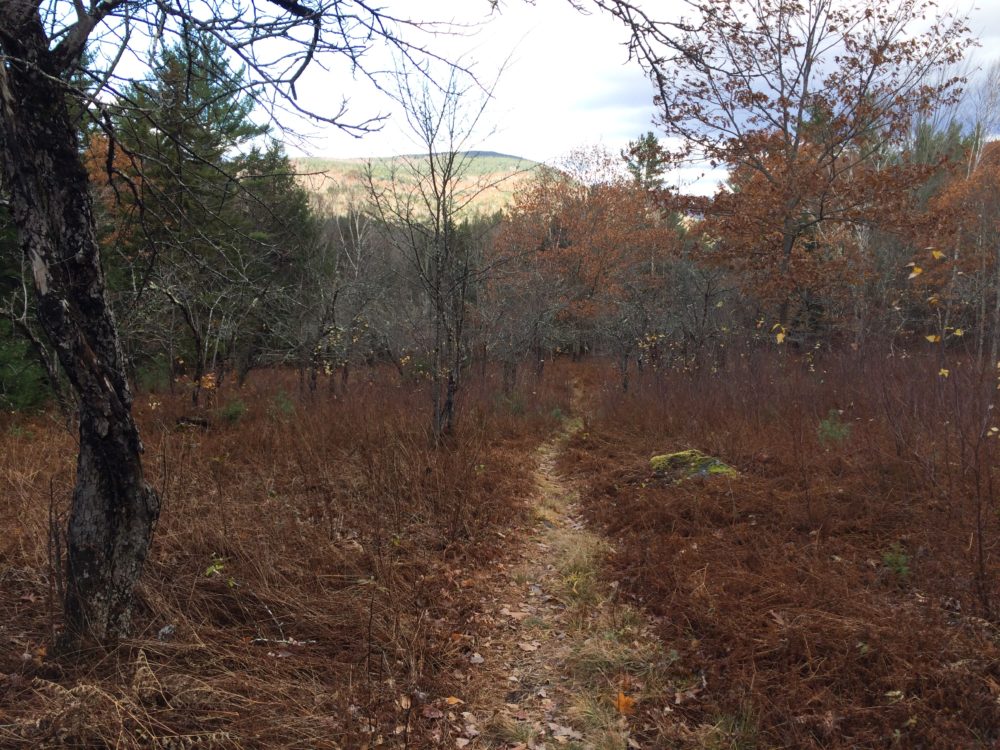Episode 132: Battling Over Bicycling Culture; Lawsuit Targets Opioid Maker’s Family Fortune

This week on NEXT:
We explore the Commonwealth of Massachusetts’ case against Purdue Pharma and the Sackler family.
Plus, we discuss the process of getting lobster licenses in Maine and learn why some have been on the waitlist for more than ten years.
Finally, we take a look back at the cultures and ideas that shaped road and mountain biking infrastructure in New England.
It’s NEXT.
Massachusetts Sues Family Behind Purdue Pharma
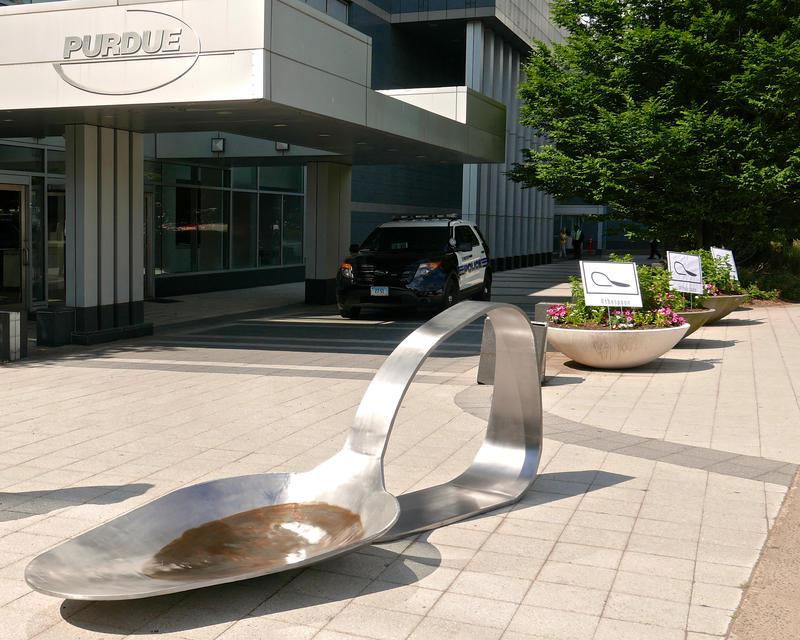
Artist Domenic Esposito crafted a giant heron spoon that Stamford gallery owner Fernando Alvarez dropped off the sculpture in front of Purdue Pharma’s headquarters in Stamford, Connecticut in June. Photo courtesy of Dominic Esposito
Massachusetts’ Attorney General, Maura Healey, has filed a lawsuit against Purdue Pharma and the Sackler Family, claiming that “Purdue pharma created the [opioid] epidemic and profited from it through a web of illegal deceit.”
The complaint against the company and the Sackler family outlines a case that Purdue Pharma knew that their drug OxyContin was the cause of overdoses, but that the company continued to profit. Purdue Pharma also explored going into the anti-addiction market. That’s what ProPublica’s Senior Reporter David Armstrong recently reported. He joins us to discuss the case.
In addition to reading David’s article, we recommend checking-out WBUR’s Martha Bebinger and Christine Willmsen’s reporting on the subject. And, don’t miss this episode of WBUR’s On Point on the subject. You can listen to WBUR’s Cristela Guerra’s report about artists’ reaction to the suit here. And you can read the full text of the Complaint filed by Massachusetts’ Attorney General Maura Healey here.
Church of Safe Injection Practices in Maine
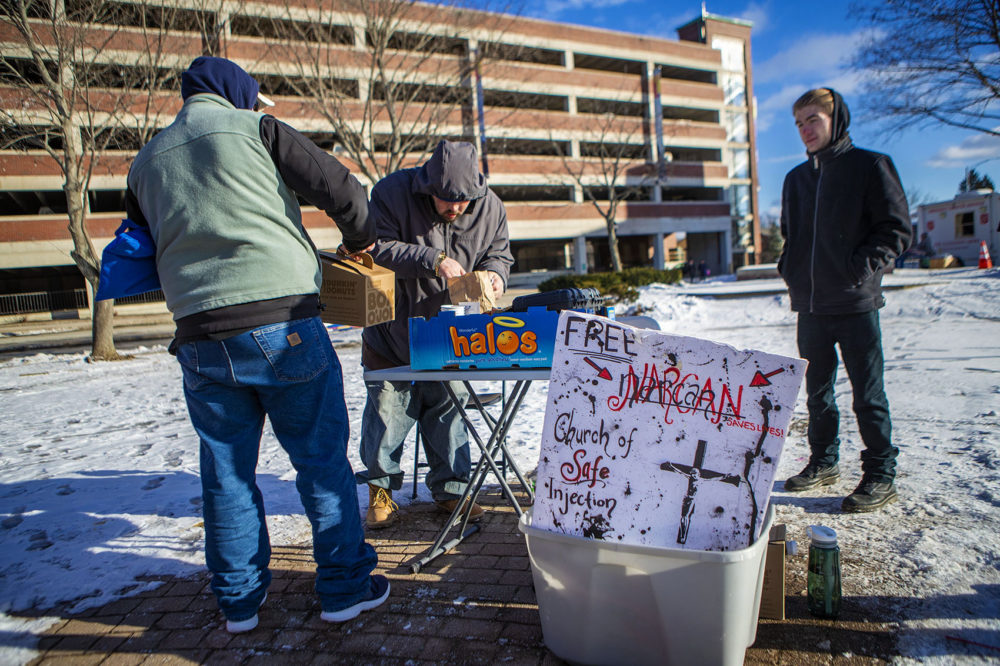
On a frigid 17º F afternoon in Pickering Square in Bangor, Maine, two men stop by a folding table set up by The Church of Safe Injection for some coffee. Photo by Jesse Costa for WBUR
The staggering number of opioid overdose deaths is prompting some people to take action – even though they could be arrested for doing what they’re doing. In cities around the country, a group called “The Church of Safe Injection” is handing out clean drug-using supplies. Group members say they have to step up because the public health system has failed.
WBUR’s Deborah Becker recently tagged along with volunteers in Maine, where the group began its work a few months ago.
Changing Lobstering Gear to Protect Endangered Right Whales
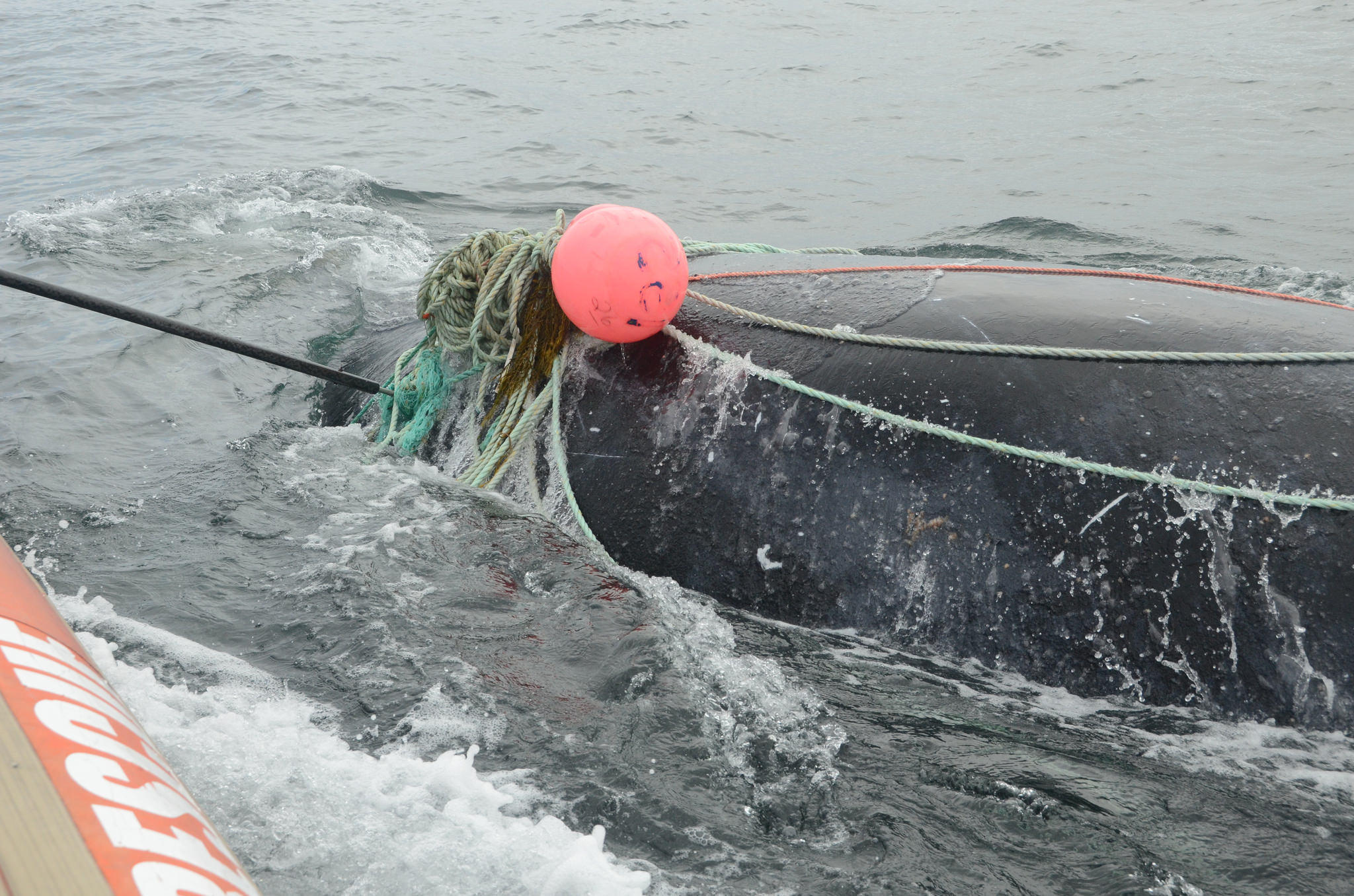
A juvenile male right whale tangled in fishing gear was rescued in August off Campobello Island. Photo courtesy Campobello Whale Rescue.
A consortium of Atlantic states fisheries managers are calling for a change to the gear lobstermen use, in an effort to reduce risks posed to the Endangered North Atlantic right whale, and to ward off potential federal action that could be even more challenging for the industry.
Maine Public’s Fred Bever reports.
Some Face a Long Waitlist to Get Into the Lobster Industry
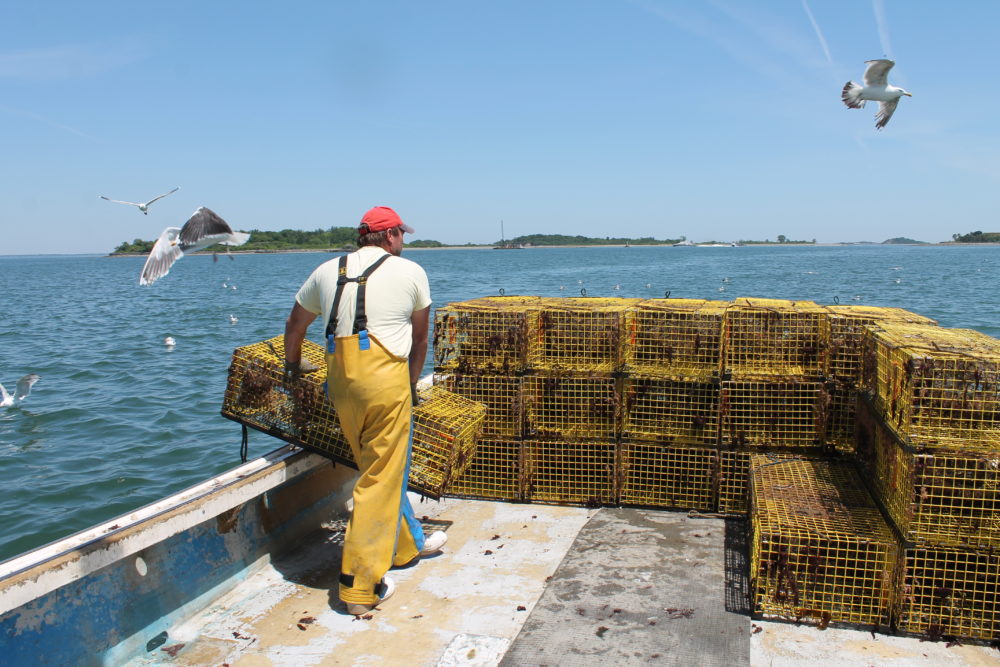
Sternman Frank Lenardis hauls lobster traps to the back of the boat. Photo by Hannah Chanatry for WBUR
Despite the challenges the lobster industry faces, it’s been going through a historic boom.
And to catch that boom you need a license to fish for lobster. But those licenses are becoming increasingly hard to come by. More than fifty people have been on a waitlist for a license for over ten years. Some for a lot longer. New legislation would change this, but it’s facing mixed feedback.
Penelope Overton has been covering this issue for the Portland Press Herald. She joins us to discuss the process of getting on and off the waitlist.
Read Penelope’s recent article, “Dreaming of a lobster license, but trapped on a waitlist.” She also wrote an article about the debate around the bill that would change the waitlist.
Aquarium Studies Whale Poop to Determine Health of Species
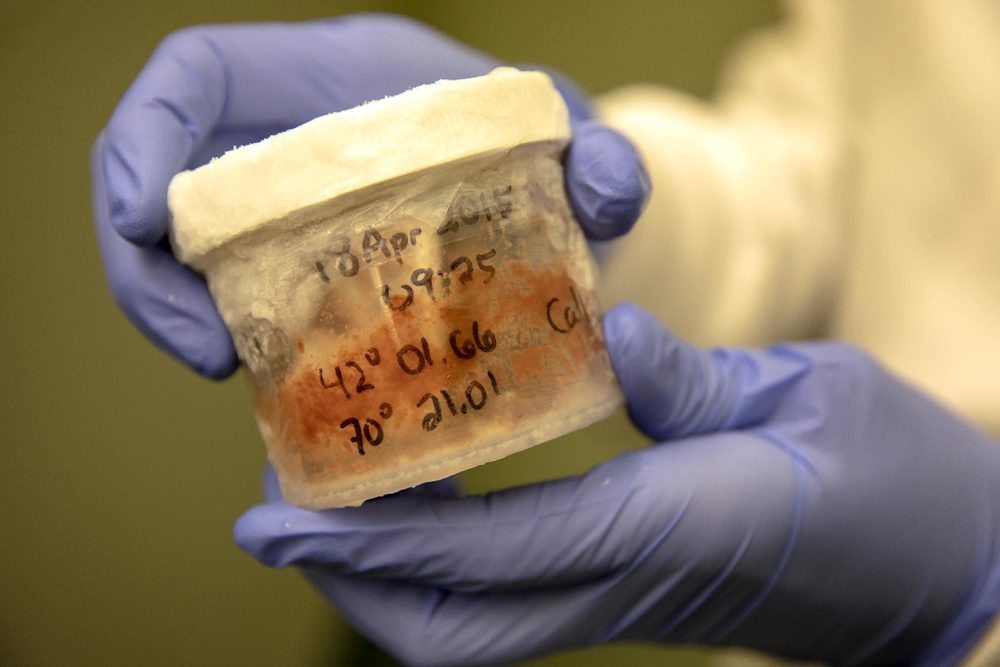
A sample of bright orange right whale scat from the New England Aquarium’s laboratory freezer. Photo by Robin Lubbock for WBUR
It isn’t just fishing gear that’s hurting whales. It’s also an inability to produce new young.
There’s been a lot of studies to understand the problem, and we want to take you now to one local resource for information, The New England Aquarium, which has the world’s largest collection of right whale poop. It sounds gross, but fecal matter can tell you a lot about a whale’s health.
WBUR’s Miriam Wasser has this story.
How Cycling Infrastructure Was Shaped
Ever go on a hike in the woods and find an unmarked path veering off the trail?
Some of these are pirate trails, carved by mountain bikers. It’s one part of a confusing infrastructure that’s been built over time…. with a history of pitting insider advocates from different camps against landowners, forest managers, urban planners, and others who just want to jump on their bike to go to work.
That’s what NHPR’s Outside/In podcast looked at in two recent episodes: “Rake and Ride,” and “Stay in your lane.”
They found both mountain biking and road biking infrastructure was shaped by competitive cyclists. And this has important implications for who participates in the sports now, and who will in the future.
NHPR’s Sam Evans-Brown, the host of Outside/In, joins us to discuss these issues.
We recommend listening to both episodes for more information on the subjects.
Exploring Maine’s Snowmobiling Industry
Snowmobilers in Vermont are seeing negative impacts from climate change, according to a University of Vermont study. That’s because the number of days with more than an inch of snow has dropped from 130 in 1960 to 75 today. 45 percent of those responding to the UVM survey have noticed the shorter seasons, and that means less time out on the trails.
And that could potentially impact Vermont’s economy. Take Maine, for instance. Snowmobilers are a huge part of winter tourism in some of the most remote parts of the state. Maine Public’s Jennifer Mitchell hit the trails and brings us this story.
Photo at the top of the page: Cyclists ride down Commonwealth Avenue in Boston. Photo by Robbin Lubbock for WBUR
About NEXT
NEXT is produced at Connecticut Public Radio
Host: John Dankosky
Producer: Lily Tyson
Digital Producer: Carlos Mejia
Senior Director: Catie Talarski
Contributors to this episode: Deborah Becker, Fred Bever, Miriam Wasser, Sam Evans-Brown, Jennifer Mitchell
Music: Todd Merrell, “New England” by Goodnight Blue Moon, “This is What You Do” by Gemma Hayes, “Wallowa Lake Monster” by Sufjan Stevens, “To Grow Away,” by The Tallest Man on Earth, “Hookey with Sloan” by Bird Creek
—
New to NEXT? You can find every episode or one you missed within our archives.
We need your feedback! Send critiques, suggestions, questions, and ideas to next@ctpublic.org. Help us spread the word! If you like what you hear, rate and review us on iTunes.

